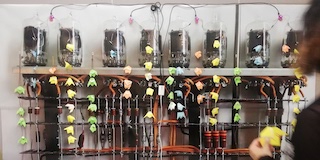FemTech.dk is a practice-based research programme that addresses the problem of how to facilitate inclusion in computing. In FemTech.dk we address this challenge by creating opportunities for people to engage in the development of interactive technologies. We make this possible through research, workshops, and events.
Former core members:
Maria Menendez-Blanco, Assistant Professor, Open University of Bolzano, Italy, previously at Department of Computer Science, University of Copenhagen, Denmark
Martin Dybdal, SimCorp A/S, previously at Department of Computer Science, University of Copenhagen, Denmark
Stina Matthiesen, Uddannelses-og forskningsministeriet, previously at Department of Computer Science, University of Copenhagen, Denmark
Acknowledgement
FemTech.dk could not have existed if not for the many people, students, colleagues, and participants who engaged with us and helped us develop concepts, organize events, design artefacts, and provide a supportive and enjoyable work environment.
Martin Dybdal took on the FemTech workshop after the first two years, joining our efforts with the UCPH Makerspace, and continuing to develop the concept as well as developing and executing the kick-starter course mainstreaming our efforts. As of 2022 The FemTech workshops are being designed and organised by Morten Aagaard Schultz and Sara Boline Lise Bang Ingvartsen and the kick-starter course is designed and organised by associate professor Daniel Spikol.
Naja Holten Møller, Stina Matthiesen, Karim Jabbar, Arni Mar Einarsson, and Nelson Tenorio joined us in developing and executing the MakerWeeks and for being amazing and supportive colleagues always ready to test our prototypes and provide reflective feedback. Further, Naja Holten Møller, Stina Mathiasen, Mia Meldgaard Jensen, and Kasper Lorentzen, who joined as teachers for the FemTech workshop in 2017. Paul Strohmeier allowed us to use his e-textile research as part of the Cyberbear workshop in 2017 and Christoffer Belange was instrumental in the implementation of the Cryptosphere for the workshop in 2018. We also thank all the computer science students who joined our activities – especially the co-teachers for the FemTech workshop in 2018, Rasmus Hvid Schmidt and Maja Hvidtfeldt Håkansson. Maja Hvidtfeld Håkansson also continued on for additional FemTech workshops, for the kick-starter course, and made amazing architectural drawings for our dream makerspace design. Thank to Haakon Lund and Trine Louise Schreiber for inviting us to join the special issue on ‘makerspaces, makers, and make movement’ in 2018, and Mette Seistrup for supporting us with room and equipment at KUA3 when we needed it. We also thank Claus Witfelt, who has been very supportive in sending his students to join the FemTech workshops each year. We also thank all the participants who have joined the FemTech workshops over the years.
Huge thanks go to Stine Broen Christensen, from Underbroen who invited us to present GRACE at Copenhagen Makers in 2017 in Carlsbergbyen. Hans Dybkjær, for developing the origami design for the GRACE installation; Peter Bjørn Rasmussen and Lise Dandanel, for composing and performing the music for the GRACE events; Jesper Bruun, for collecting data about GRACE during Copenhagen Makers; and Kasper Lorentzen, for implementing the GRACE app. Also, thanks to Chi Pham, who joined the Copenhagen Maker event in 2017. We would also like to mention Stavris Solo, who as the lab manager at the Southern campus has always supported our efforts for the MakerWeek and all kinds of other events – and for providing a home for the GRACE installation.
We also thank all the students who have joined the Makerspace or supported the FemTech research in different ways by joining workshops, by doing their master’s thesis as part of FemTech, or by supporting the effort and being amazing students. In particular, we would like to mention Christoffer Belange, Mette Hermansen, Jenny Margrethe Vej, Søren Sørensen, Jonathan Jensen, Olivia Linder Tabel, and Frederik Freiesleben, who each have produced excellent research within FemTech as part of their master’s or bachelor’s thesis.
We thank Heike Vögele, for visiting us in Copenhagen and collecting data about makerspaces; Sine Zambach, for featuring FemTech in her book; Lone Kofoed, for featuring GRACE in Wilful Technologies; and Ben Christensen, for inviting us to talk about FemTech at SAP, #sheinnovate in New York. We thank Martha Larson and Susanne Boll for inviting us to present the keynote at ACM MM 2019 in Nice, France.
Finally, we also thank the former Head of Department, Mads Nielsen, for supporting the FemTech initiatives from the beginning – and the current Head of Department, Jakob Grue Simonsen, for continuing to support FemTech as well as prioritizing the agenda of Inclusive DIKU.
FemTech continues today as an important research-based initiative in the Department of Computer Science, University of Copenhagen, especially with the research of the third author, Valeria Borsotti, PhD, and her role as Diversity Chair in the department. As a result, two new initiatives were created in 2021: Code of Conduct and Inclusive DIKU. Creating organizational requires persistence, commitment, time, effort, resources, and collaborative engagement.
Inclusive DIKU continues in 2022 headed by Ann Steendahl Søndergaard.
